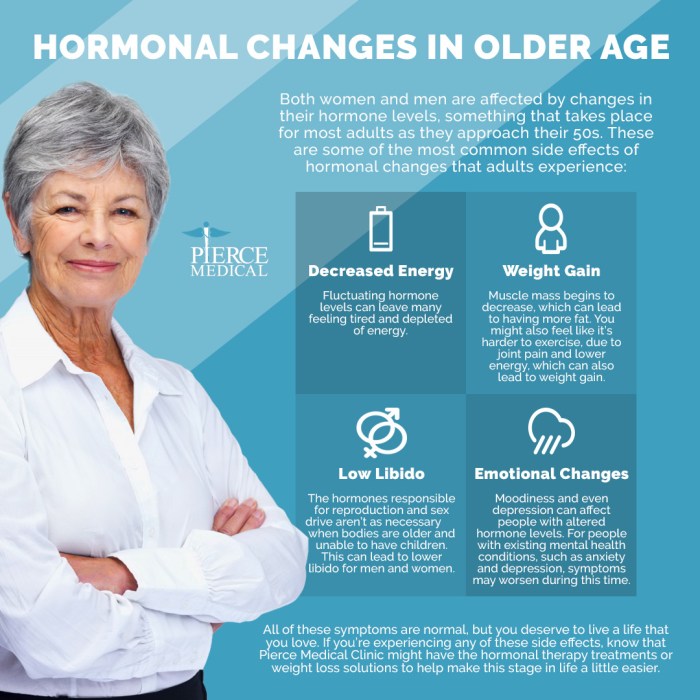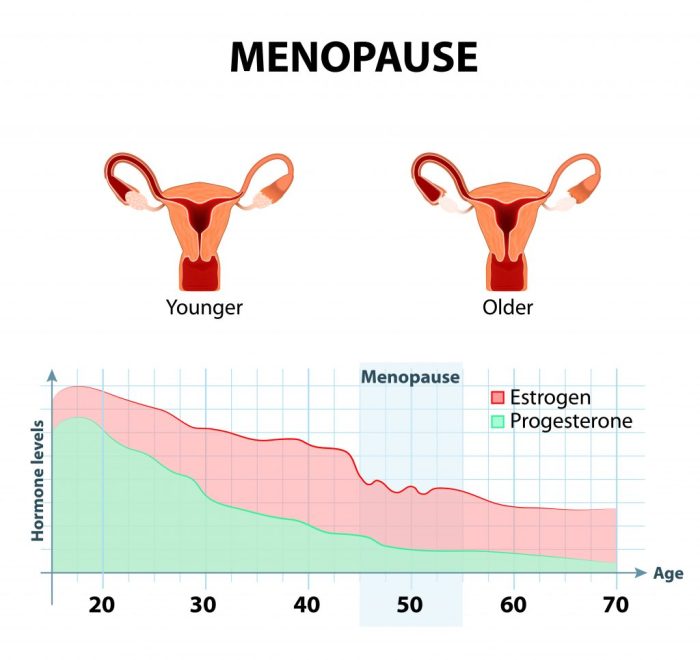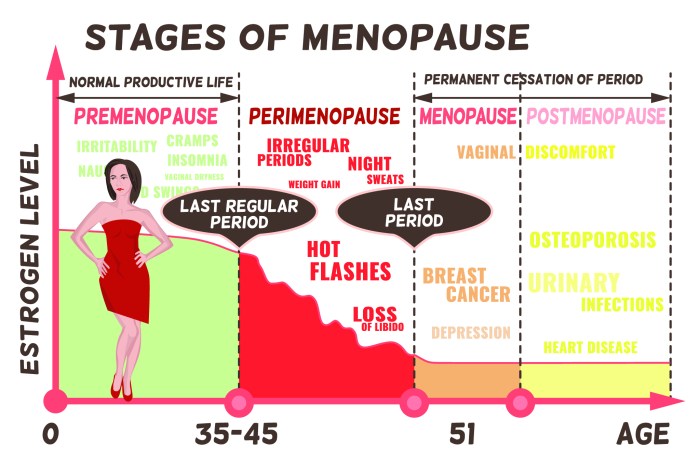Hormonal changes and weight loss in women over 40: A journey through the complexities of metabolism, hormones, and weight management. As we navigate this transformative stage of life, understanding the intricate interplay between hormones and weight becomes crucial. Join us as we unravel the secrets of hormonal balance, explore effective strategies, and empower you with the knowledge to achieve your weight loss goals.
From the impact of estrogen and progesterone on metabolism to the role of thyroid hormones, insulin resistance, and stress, we’ll delve into the science behind hormonal changes and their impact on weight loss efforts. We’ll also explore the mind-body connection, the importance of sleep, and how exercise and diet can influence hormonal balance.
Whether you’re experiencing unexplained weight gain or simply seeking to optimize your hormonal health, this guide will provide you with the tools and insights you need to succeed.
Impact of Estrogen and Progesterone on Metabolism
As women transition into their 40s, hormonal changes, particularly the decline in estrogen and progesterone, can significantly impact metabolism and weight management. Understanding the role of these hormones is crucial for developing effective weight loss strategies.
Estrogen and Metabolism
Estrogen plays a vital role in regulating metabolism by influencing the body’s ability to burn calories and store fat. As estrogen levels decline with age, the body becomes less efficient at burning calories, leading to a slower metabolism and increased fat storage, especially around the abdomen.
Progesterone and Appetite
Progesterone, another key hormone, affects appetite and food cravings. During the menstrual cycle, progesterone levels rise in the second half, which can lead to increased hunger and cravings for sugary and fatty foods. After menopause, when progesterone levels drop, these cravings may diminish, but the overall impact on weight management depends on other factors, such as diet and exercise.
Thyroid Hormone Changes and Weight Loss: Hormonal Changes And Weight Loss In Women Over 40
As women enter their 40s, their thyroid function can undergo significant changes. Thyroid hormones play a crucial role in regulating metabolism, the process by which the body converts food into energy. Understanding how these changes impact weight loss efforts is essential for women over 40.
Role of Thyroid Hormones in Weight Management
Thyroid hormones, primarily thyroxine (T4) and triiodothyronine (T3), regulate basal metabolic rate (BMR), the number of calories the body burns at rest. Higher thyroid hormone levels lead to an increased BMR, which promotes weight loss, while lower levels have the opposite effect.
Thyroid Function Changes with Age
With age, thyroid function can decline, especially in women. This decline can result in decreased thyroid hormone production, leading to a condition known as hypothyroidism. Hypothyroidism can cause weight gain, fatigue, and difficulty losing weight.
Impact of Thyroid Imbalances on Weight Loss
Thyroid imbalances, whether hypothyroidism or hyperthyroidism (overactive thyroid), can significantly impact weight loss efforts. In hypothyroidism, the reduced metabolic rate makes it more challenging to burn calories and lose weight. Conversely, hyperthyroidism can increase BMR, leading to unintended weight loss.
Insulin Resistance and Weight Gain
As we age, our bodies undergo various hormonal changes that can impact our metabolism and weight. One of the most significant changes is a decline in insulin sensitivity, which can lead to insulin resistance.
Insulin is a hormone produced by the pancreas that helps regulate blood sugar levels. When we eat, insulin helps glucose from food enter our cells for energy. However, over time, our cells can become less responsive to insulin, leading to insulin resistance.
Prevalence of Insulin Resistance in Women Over 40
Insulin resistance is a common condition that becomes more prevalent in women over 40. This is due to several factors, including hormonal changes, decreased physical activity, and changes in body composition.
As women approach menopause, their estrogen levels decline. Estrogen helps to improve insulin sensitivity, so its decline can contribute to insulin resistance.
Additionally, as we age, we tend to become less physically active. This can also lead to insulin resistance, as exercise helps to improve insulin sensitivity.
Finally, changes in body composition, such as an increase in body fat, can also contribute to insulin resistance.
Effects of Insulin Resistance on Weight Loss and Health, Hormonal changes and weight loss in women over 40
Insulin resistance can make it more difficult to lose weight. When insulin is not working properly, glucose can build up in the bloodstream, leading to weight gain.
Insulin resistance is also linked to other health problems, such as type 2 diabetes, heart disease, and stroke. Therefore, it is important to manage insulin resistance to maintain a healthy weight and overall well-being.
Stress and Cortisol Levels
Stress is a natural response to challenging or threatening situations. When you’re stressed, your body releases the hormone cortisol. Cortisol helps you to cope with stress by increasing your heart rate, blood pressure, and energy levels. It also helps to break down carbohydrates and fats for energy.However,
chronic stress can lead to weight gain. This is because cortisol can cause hormonal imbalances that affect weight loss. For example, cortisol can increase the production of insulin, which is a hormone that promotes fat storage. Cortisol can also decrease the production of thyroid hormone, which is a hormone that helps to regulate metabolism.If
you’re trying to lose weight, it’s important to manage stress. There are a number of ways to do this, such as:* Exercise
- Yoga
- Meditation
- Deep breathing
- Spending time in nature
- Talking to a therapist
Sleep and Weight Loss
Sleep plays a crucial role in weight loss and hormonal balance. When you don’t get enough sleep, your body produces more of the stress hormone cortisol, which can lead to increased appetite and cravings for unhealthy foods.
Additionally, sleep deprivation can disrupt the production of leptin and ghrelin, two hormones that regulate hunger and fullness. When leptin levels are low and ghrelin levels are high, you may feel hungrier and eat more.
Tips for Improving Sleep Quality and Duration
- Establish a regular sleep schedule and stick to it as much as possible, even on weekends.
- Create a relaxing bedtime routine that may include taking a warm bath, reading a book, or listening to calming music.
- Make sure your bedroom is dark, quiet, and cool.
- Avoid caffeine and alcohol before bed.
- Get regular exercise, but avoid working out too close to bedtime.
Exercise and Hormone Regulation
Exercise is an essential part of a healthy lifestyle, and it can play a significant role in regulating hormones that affect weight loss. When you exercise, your body releases hormones that help to increase metabolism, burn fat, and build muscle.
These hormones include:
- Epinephrine (adrenaline)
- Norepinephrine (noradrenaline)
- Growth hormone
- Testosterone
- Cortisol
Different types of exercise can impact hormone levels in different ways. For example, aerobic exercise, such as running or swimming, has been shown to increase levels of epinephrine and norepinephrine, which help to increase metabolism and burn fat. Resistance training, such as weightlifting or bodyweight exercises, has been shown to increase levels of growth hormone and testosterone, which help to build muscle and burn fat.
Exercise Programs for Weight Loss
If you are a woman over 40 and you are looking to lose weight, it is important to find an exercise program that you enjoy and that you can stick to. The best exercise program for you will vary depending on your fitness level and your individual needs.
Hormonal changes in women over 40 can lead to increased weight gain. But don’t despair! Weight loss motivation for women over 40 is out there. The key is to find what works for you and stick with it. Hormonal changes can make weight loss more challenging, but it’s not impossible.
With the right mindset and a little effort, you can reach your weight loss goals.
However, some general recommendations for women over 40 who are looking to lose weight include:
- Aim for at least 150 minutes of moderate-intensity aerobic activity or 75 minutes of vigorous-intensity aerobic activity each week.
- Incorporate resistance training into your routine at least twice a week.
- Find an exercise buddy or join a group fitness class to help you stay motivated.
- Listen to your body and rest when you need to.
Diet and Hormone Balance
As we age, our bodies undergo various hormonal changes that can impact our weight. Understanding the role of diet in maintaining hormonal balance is crucial for women over 40 seeking weight loss.
Certain dietary choices can influence hormone levels, such as estrogen, progesterone, thyroid hormone, and insulin. Maintaining a balanced diet that supports hormonal balance is essential for weight loss.
Dietary Recommendations for Hormone Balance and Weight Loss
- Include fiber-rich foods:Fiber helps regulate blood sugar levels, which can impact insulin sensitivity and weight management.
- Consume lean protein:Protein helps promote satiety, supports muscle mass, and can balance hormones like estrogen and progesterone.
- Incorporate healthy fats:Healthy fats, such as those found in avocados, nuts, and olive oil, can support hormone production and reduce inflammation.
- Limit processed foods:Processed foods often contain high amounts of sugar, unhealthy fats, and artificial ingredients, which can disrupt hormone balance and contribute to weight gain.
- Hydrate adequately:Water helps flush out toxins, supports hormone production, and can promote a feeling of fullness.
By incorporating these dietary recommendations into your lifestyle, you can support hormonal balance and create a foundation for successful weight loss.
Hormonal Therapies and Weight Loss
Hormonal therapies may play a role in weight loss for women over 40. These therapies aim to address hormonal imbalances that can contribute to weight gain.
Types of Hormonal Therapies
There are different types of hormonal therapies available, including:
Estrogen replacement therapy (ERT)
Replaces estrogen levels that decline with menopause.
Progesterone replacement therapy (PRT)
Used to balance estrogen levels in women who have not had a hysterectomy.
Testosterone replacement therapy (TRT)
May improve muscle mass and reduce body fat.
Hey there, lovely lady! Are you a fabulous woman over 40 who’s ready to shed those pesky pounds? Hormonal changes can make it tough, but don’t fret! Check out these Weight loss recipes for women over 40 and get ready to say goodbye to stubborn belly fat.
Remember, it’s all about finding a healthy balance that works for your body and lifestyle. So, embrace the hormonal shifts and let’s conquer this weight loss journey together!
Thyroid hormone replacement therapy
Hormonal changes during this time can make losing weight challenging. Weight loss supplements for women over 40 can be a helpful addition to a healthy diet and exercise plan, but it’s essential to consult a healthcare professional before starting any new supplement regimen.
With the right approach, women over 40 can overcome the hormonal hurdles and achieve their weight loss goals.
Addresses thyroid hormone deficiencies that can lead to weight gain.
Benefits and Risks
Hormonal therapies can offer potential benefits, such as:
- Reducing hot flashes and other menopausal symptoms
- Improving mood and cognitive function
- Increasing bone density
- Promoting weight loss
However, there are also potential risks to consider, such as:
- Blood clots
- Stroke
- Heart disease
- Cancer
Importance of Consultation
It is crucial to consult with a healthcare professional before considering hormonal therapies. They can assess your individual needs, discuss the potential benefits and risks, and determine if hormonal therapy is right for you.
Mind-Body Connection and Weight Loss
Weight loss and hormonal balance are not solely dependent on physical factors; the mind-body connection plays a crucial role. Stress, emotions, and beliefs can significantly influence hormone levels and weight loss efforts.
When under stress, the body releases cortisol, a hormone that can lead to increased appetite and cravings for sugary or fatty foods. Chronic stress can disrupt hormonal balance, making it harder to lose weight.
Mindfulness and Stress Reduction
To combat the negative effects of stress on weight loss, incorporating mindfulness and stress reduction techniques is essential. Mindfulness involves paying attention to the present moment without judgment, which can help reduce stress and emotional eating.
- Practice meditation or deep breathing exercises.
- Engage in activities that bring joy and relaxation.
- Seek professional help if stress becomes overwhelming.
Medical Conditions and Hormone Imbalances
As women progress through their 40s, they may experience hormonal changes that can affect their weight. In some cases, these changes can be caused by underlying medical conditions that can affect hormone levels and lead to weight gain.
It’s important to seek medical advice if you experience unexplained weight gain, as it could be a sign of an underlying medical condition that requires treatment.
Examples of Medical Conditions
- Thyroid disorders:The thyroid gland produces hormones that regulate metabolism. An underactive thyroid (hypothyroidism) can slow down metabolism, leading to weight gain.
- Cushing’s syndrome:This condition is caused by high levels of the hormone cortisol, which can lead to weight gain, especially around the face and abdomen.
- Polycystic ovary syndrome (PCOS):This condition is characterized by irregular periods, high levels of male hormones (androgens), and insulin resistance, which can all contribute to weight gain.
- Menopause:The transition to menopause can cause hormonal changes that can lead to weight gain, especially around the abdomen.
Personal Experiences and Case Studies
Women over 40 who have successfully lost weight by addressing hormonal imbalances have often faced challenges and setbacks. Their stories can provide valuable insights and inspiration for others seeking to improve their weight and hormonal health.
These women have typically adopted a multifaceted approach, including dietary changes, exercise, stress management, and sometimes hormonal therapies. They have also learned to listen to their bodies and make adjustments as needed.
Case Study: Sarah
Sarah, a 45-year-old woman, struggled with weight gain and fatigue for several years. After consulting with a doctor, she discovered that she had low estrogen levels and insulin resistance. She made changes to her diet, including reducing processed foods and sugar, and began exercising regularly.
She also started taking hormone replacement therapy (HRT) to address her estrogen deficiency.
Within a few months, Sarah began to lose weight and feel more energetic. She has continued to make healthy lifestyle choices and has maintained her weight loss for over two years.
Last Word
Hormonal changes and weight loss in women over 40 is a multifaceted journey that requires a holistic approach. By understanding the hormonal shifts that occur during this stage of life, we can make informed choices that support our weight loss goals.
Remember, you’re not alone in this journey. With the right knowledge and strategies, you can navigate these hormonal changes, regain control of your weight, and live a healthier, more balanced life.
FAQ Insights
Q: Why do women over 40 often experience weight gain?
A: Declining estrogen levels, thyroid imbalances, and insulin resistance can contribute to weight gain in women over 40.
Q: How can exercise help with weight loss in women over 40?
A: Exercise can help regulate hormones, boost metabolism, and reduce stress, all of which can support weight loss.
Q: What dietary changes can help improve hormonal balance in women over 40?
A: A balanced diet that includes plenty of fruits, vegetables, whole grains, and lean protein can help maintain hormonal balance.
Q: How does stress affect weight loss in women over 40?
A: Stress can lead to hormonal imbalances that increase appetite and cravings, making weight loss more challenging.



